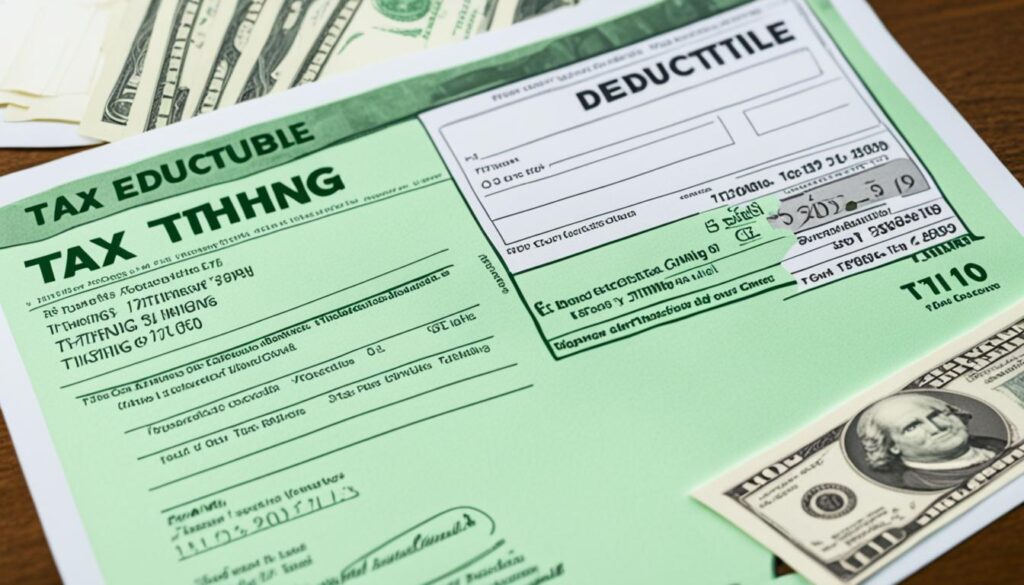Picture this: It’s tax season, and you’re sitting at your dining table, surrounded by receipts and paperwork, trying to make sense of it all. As you diligently go through your expenses, you come across a significant portion of your income that you’ve faithfully contributed as tithing to the Church of Jesus Christ of Latter-day Saints (LDS). A thought crosses your mind: Is this tithing tax deductible?
You’re not alone in wondering about the tax deductibility of LDS tithing. Many individuals who practice this religious tradition may have the same question, and it’s important to find clarity on the matter.
In this article, we will explore the rules and guidelines set by the Internal Revenue Service (IRS) to determine whether LDS tithing is tax deductible. So let’s dive in and discover the answers you’re looking for.
Key Takeaways:
- LDS tithing is considered a form of charitable donation.
- The IRS recognizes the LDS Church as a tax-exempt charitable organization.
- Tithing to the LDS Church, if it is your place of worship, may be tax-deductible.
- Consulting with a tax professional is recommended to understand your individual circumstances.
- Deciding whether or not to claim tithes on your taxes is a personal choice.
Are Tithes Considered Charitable Donations?
Tithes, by definition, involve giving a portion of your income to a religious organization. And in the case of the LDS Church, tithing is indeed considered a form of charitable giving. But what does it take for your tithes to be recognized as charitable contributions by the IRS?
To meet the criteria of being a charitable contribution, the organization you contribute to must qualify as a tax-exempt charitable organization. Fortunately, the IRS recognizes the LDS Church as a tax-exempt charitable organization, which means that tithes paid to the Church may be considered charitable donations for tax purposes.
So, when you faithfully contribute your tithes to the LDS Church, you can rest assured that you’re not only fulfilling your religious obligations but also making charitable donations that may provide tax benefits.
| Benefits of Tithing as a Charitable Donation |
|---|
| Tax Deductibility |
| Supporting Charitable Work |
| Personal Spiritual Satisfaction |
Is Tithing Tax-Deductible?
When it comes to tithing, one of the common questions that arises is whether it is tax-deductible. The answer to this question depends on certain factors. To qualify as a tax-deductible contribution, the organization to which you contribute must be recognized by the IRS as a tax-exempt organization.
Fortunately, churches, including the LDS Church, are automatically considered tax-exempt under IRS Code Section 501(c)(3) as long as they meet the necessary requirements. This means that if the LDS Church is your place of worship, tithing to the church may be tax-deductible.
However, it’s important to keep in mind that individual circumstances may vary, and it’s always a good idea to consult with a tax professional for personalized advice regarding your specific situation. They can provide guidance on whether your tithing can be deducted on your taxes and help ensure you’re taking full advantage of any available tax benefits.
While tithing to your church can have spiritual and personal significance, it’s always wise to consider the potential tax benefits as well. By understanding the rules and guidelines around tithing and tax deductibility, you can make informed decisions about your finances and contributions.
Pros and Cons of Claiming Tithing on Taxes
| Pros | Cons |
|---|---|
| 1. Reduce taxable income | 1. May require itemizing deductions |
| 2. Potentially lower tax liability | 2. Not mandatory to claim tithes |
| 3. Support your place of worship | 3. Personal beliefs and preferences |
| 4. Contribute to charitable causes | 4. Written record required for larger donations |
Consult with a tax professional for personalized advice tailored to your specific financial situation.

Should You Claim Your Tithes on Your Taxes?
When it comes to tithing on your taxes, the decision ultimately lies in your hands. While making contributions to a tax-exempt charitable organization like the LDS Church can potentially qualify you for a tax deduction, it is not mandatory to claim your tithes on your taxes. This choice may stem from personal beliefs or individual preferences.
However, before you decide to forgo claiming your tithes, it’s essential to have a clear understanding of the IRS rules regarding reporting charitable donations. In particular, it’s important to note that for donations of $250 or more, you must obtain a written record of acknowledgement from the charitable organization.
Claiming your tithes on your taxes is a decision that should align with your values and financial goals. There are no right or wrong answers, but it’s crucial to make an informed choice based on your unique circumstances.
Pros and Cons of Claiming Tithes on Your Taxes
Before making a final decision, let’s explore the potential advantages and disadvantages of claiming your tithes on your taxes.
| Pros | Cons |
|---|---|
|
|
|
|
|
|
|
Tips for Reporting Your Tithes
If you decide to claim your tithes on your taxes, it’s important to ensure accurate reporting. Here are a few tips to help you navigate the process:
- Maintain detailed records: Keep track of your tithing contributions throughout the year. This includes donation receipts, bank statements, or any other supporting documents.
- Organize your records: Create a designated folder or file to store all your tithing-related paperwork. This will make it easier when it’s time to prepare your taxes.
- Consult with a tax professional: Seeking guidance from a tax professional can provide valuable insights and ensure you comply with all IRS requirements.
Remember, ultimately, the decision to claim your tithes on your taxes rests with you. Consider your personal beliefs, financial situation, and long-term goals when making this choice.
Should You Tithe on Tax Refund?
Tithing on a tax refund is a personal decision. It’s a moment that gives you pause to reflect on your values and beliefs. You might wonder, should you tithe on that unexpected windfall of extra cash? Well, there’s no one-size-fits-all answer to this question. It ultimately comes down to your personal convictions and the teachings of your faith.
Some may feel compelled to give a portion of their tax refund as an additional act of generosity. After all, your refund is a bonus, a surplus that you weren’t necessarily counting on. By choosing to tithe on your tax refund, you are demonstrating gratitude and a spirit of giving back. It can be a unique opportunity to bless others and support your church community.
On the other hand, you may have other financial priorities or personal obligations that require attention. Allocating your tax refund for different purposes, such as paying off debt or investing in your family’s needs, can also align with your values. Taking care of your immediate responsibilities can be just as noble.
Ultimately, the decision to tithe on your tax refund is a matter of personal conviction. Reflect on what is important to you, consider your financial situation, and make a choice that feels right for you and your family. Trust your heart, lean on your faith, and use your tax refund wisely.
Remember, seeking guidance from your spiritual leaders and consulting with a tax professional can provide valuable insights specific to your circumstances.
Pros and Cons of Tithing on Tax Refund
| Pros | Cons |
|---|---|
| Tithing on tax refund supports your church community and demonstrates gratitude. | Other financial priorities may require attention. |
| It aligns with personal beliefs and values regarding giving back. | There may be a need to allocate the refund for immediate obligations or debt repayment. |
| Tithing can bring a sense of joy and fulfillment in offering a portion of unexpected income. | The decision to tithe should be guided by personal convictions and faith, not societal pressure. |
How Much Tithing Is Tax-Deductible?
When it comes to tax deductibility, you might be wondering how much of your tithing can be deducted. Well, the good news is that there is no specific limit on how much tithing is tax-deductible. However, there are general limits on the total deduction amounts for charitable contributions.
In general, the IRS sets a limit on the amount an individual can deduct for charitable donations. According to IRS regulations, you may not deduct more than 60% of your adjusted gross income (AGI) for charitable contributions. Now, you might be thinking, does that mean you can deduct 60% of your tithing? Unfortunately, no. Tithing is just a portion of your income. Typically, tithing amounts to 10% of your income, but individual circumstances may vary.
To put it simply, whether or not your tithing reaches the deduction limit depends on the overall amount of your income and other charitable contributions. While it is highly unlikely that tithing alone would reach the 60% deduction limit, if you make additional charitable donations, the total deduction amount may be affected. Consulting with a tax professional is recommended to get personalized advice based on your specific circumstances.
| Income (AGI) | Maximum Deduction for Charitable Contributions (60% of AGI) | Estimated Tithing Amount (10% of Income) | Potential for Tithing to Reach Deduction Limit |
|---|---|---|---|
| $50,000 | $30,000 | $5,000 | Not likely. Tithing alone is not expected to reach the deduction limit. |
| $100,000 | $60,000 | $10,000 | Not likely. Tithing alone is not expected to reach the deduction limit. |
| $200,000 | $120,000 | $20,000 | Possible. Tithing combined with other contributions may approach the deduction limit. |
Remember, individual circumstances vary, and it is always best to consult with a tax professional who can provide personalized advice based on your specific situation. They can help determine the tax-deductible amount for your tithing and guide you through the process of claiming deductions on your taxes.

How Does Tithing Affect Your Taxes?
Tithing can have a significant impact on your taxes, offering potential benefits and reducing your tax liability. When you deduct your tithing as a charitable donation, you effectively lower your overall taxable income. By doing so, you may potentially decrease the amount of tax you owe. However, it’s important to note that in order for tithing to affect your taxes, it must be qualified as a deductible contribution.
Keep in mind that claiming tithes on your taxes is not mandatory. While tithing can be deducted as a charitable donation, the decision to claim it depends on individual circumstances and preferences. If tithing is a significant part of your religious practice and you qualify for tax deductions, taking advantage of this opportunity may provide financial benefits.
However, navigating the complexities of tax law can be challenging. To ensure you’re making the most informed decisions, it’s highly recommended to consult with a tax professional. They can provide personalized advice regarding tithing, tax deductions, and the specific impact on your taxes. This expert guidance will help you maximize your returns while maintaining compliance with IRS regulations.








